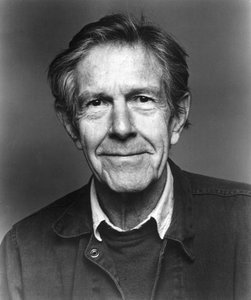McLuhan was an inspiration and mentor to John Cage even though McLuhan was only a year older than the experimental composer. Later in life they became friends. Among Cage's other inspirations/mentors/friends was Marcel Duchamp.
 Both McLuhan and Cage agree that the eye has dominated the western mind. That we should take sounds more seriously. Both are interested in the fact that you cannot shut your ears. Both are frustrated with the rigidness of understanding space within western culture.
Both McLuhan and Cage agree that the eye has dominated the western mind. That we should take sounds more seriously. Both are interested in the fact that you cannot shut your ears. Both are frustrated with the rigidness of understanding space within western culture. “When we ignore it, it disturbs us. When we listen to it, we find it fascinating."
This is an excerpt from an essay Cage wrote in ___. He explains his reasons for using chance operations in his compositions and expands on his ideas behind sound. After this essay the critical and academic worlds spent much less time on the content of Cage's art and mainly focused on his ideas about art and sound. This contradicts one of his main ideas that the intention of the artist is not important to the finished work.
For example, 4’33’’, probably his most famous piece, is usually talked about with regards to the ideas behind it; There is no silence. Listen to the sounds around you. The audience is part of the song... But they don't talk about the song.
"I have nothing to say and I am saying it." - John Cage
Maybe the critics prove him wrong. Is his work only valuable for the theoretical point it makes?
By using computer systems that run chance operations to determine what Cage does in his art, he is very literally using circuitry as an extension of the nervous system, like McLuhan says.
“Using chance operations assumes that each thing that happens is the best.”
No comments:
Post a Comment